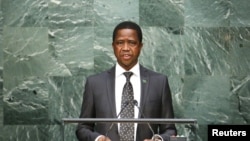Zambia’s president, Edgar Lungu, has directed members of the governing Patriotic Front Party (PF) to avoid commenting on issues of tribalism.
His comments were made after Information Minister Chishimba Kambwili was quoted as saying people in some parts of Zambia would not vote for Jesus even if he were to compete against somebody that they’ve been voting for during elections.
His remarks were made during a program on the state broadcaster, Zambia Broadcasting Cooperation. Kambwili’s comments drew sharp reaction from a section of the population that accused him of fanning tribalism and regionalism ahead of this year’s general election.
Issues of tribalism and regionalism emerged in the run up to the presidential by-election following the death of President Michael Sata. Civil society groups say some political parties thrive on tribalism and regionalism as a divide and conquer tactic to canvass for votes as part of their campaign strategy.
Frank Bwalya, a Catholic priest who is deputy spokesman for the PF, contends that voting patterns in last year’s presidential vote showed deep-seated regional and tribal sentiments. He adds that there appears to be an increased sensitivity of tribalism and regionalism ahead of this year’s polls. Bwalya however said the president’s call does not mean the ruling PF is fanning tribalism.
“People react sharply to anything where even just even the term tribalism is mentioned, and of late this has heightened in the country,” he said.
“The president is not saying our members as a ruling party have been engaging in tribalism or issuing tribal statements. Not at all, but that they should stop talking about tribalism…The president is putting his foot down not only to members of the governing party, in terms of urging them not to make any comment on tribalism. But also, for all Zambians to realize that this is a very unproductive undertaking. And with him promoting one Zambia, one nation that everyone should come on board and promote what is common about our people.”
Opposition groups have questioned the timing of the president’s directive. They said he served as a Cabinet minister as well as president and is fully aware of the situation in the country. They argue that his directive is a public relations exercise merely to win votes in the runup to the election.
“The president has been very clear, categorical about his position against tribalism in our country and he has continued to call upon all Zambians to desist to engage in anything or making any statements that would be divisive that would be understood as tribal,” said Bwalya.
“He thinks it’s the right time to send a strong warning to PF members to ensure that they don’t comment on tribalism. Because our members are being accused of accusing other people of tribalism even when what they say is not necessarily accusing other people of tribalism, but simply condemning tribalism because it is a vice that should be condemned.”
Civil society groups warn that if not quickly resolved, the use of tribalism and regionalism could undermine the country’s social unity fabric. Bwalya says some Zambians appear to be unwilling to confront tribalism because of political benefits.
“As a party, we have no problem talking about tribalism, nevertheless the president has directed that we should not because it is generating very unhealthy, and in many cases very heated debate,” he said.
“We have never counted on tribalism as a mechanism or system to win elections and we have been in the forefront condemning it, and urging all Zambians to condemn it. Other civil society organizations for other reasons best known to themselves have aligned themselves and fashioned their messages in a manner that clearly show that they have no problem with tribalism.”




